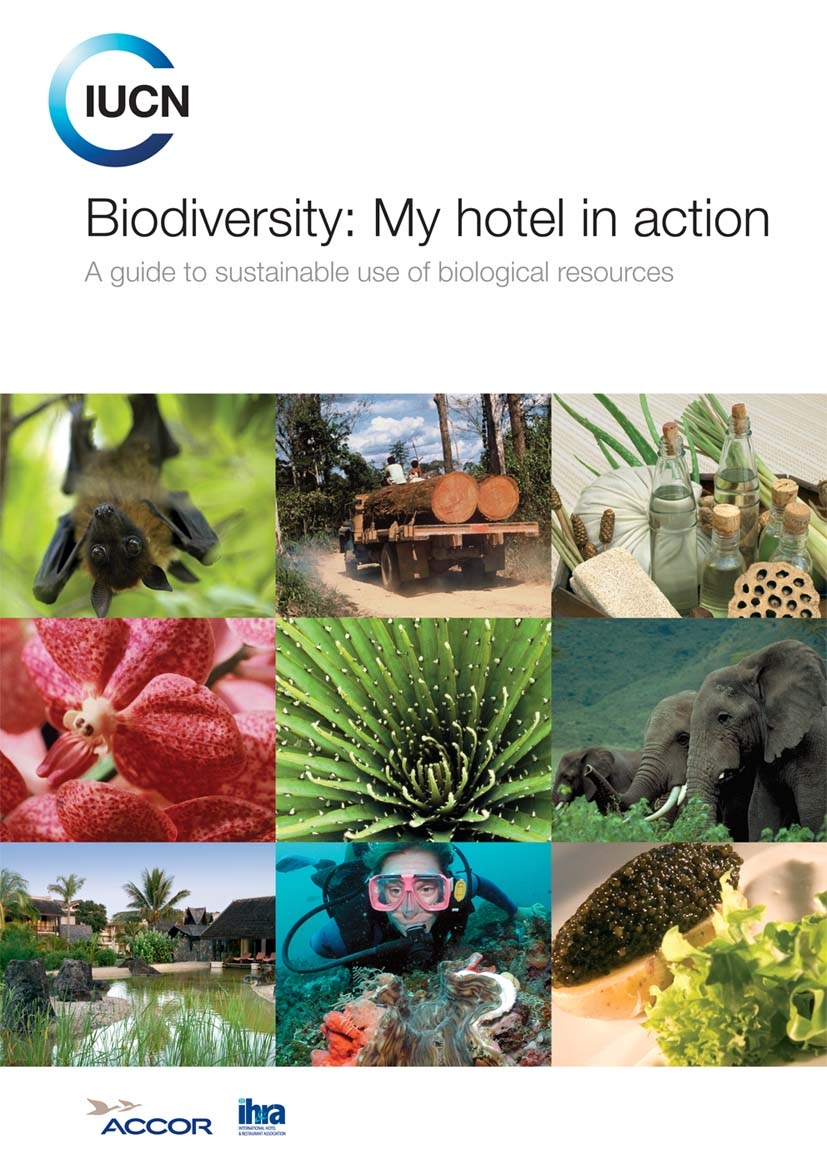How to help your hotel help Nature
From cotton towels and sheets in guest rooms, to food in the restaurant and wood used for furniture and fittings – the products of biodiversity are everywhere inside hotels. Outside, plants and animals make a hotel’s public spaces and gardens attractive for guests, while beyond the hotel gates, parks, green spaces, coasts and natural habitats provide guests with opportunities for recreation and enjoyment.

Photo:
Recognizing these important links, Accor, one of the leading hotel companies in the world, has joined forces with the International Union for Conservation of Nature, to develop guidelines on the sustainable use of biological resources in hotels’ everyday operations.
“We have identified actions in all operational areas that will help hotels minimize their impact on the environment and contribute to biodiversity conservation,” says Giulia Carbone, of IUCN’s Business and Biodiversity Programme. “Hotels can have positive effects on nature conservation, as the examples in this guide show.”
The guide, Biodiversity: My hotel in action, is aimed at all hotel managers and owners of small and large hotels, located anywhere, from cities to mountains and coastal areas.
“Deciding where to locate hotels and how to design them, how to manage energy and water consumption effectively, and how to dispose of waste properly were all topics covered in detail in a number of existing valuable publications,” says Patricia Cortijo, Accor’s Environment Director. “What we didn’t have until now, however, was a reliable reference on how to minimize our direct impact on biodiversity during everyday operations.”
The guide is structured around the main operational areas of a hotel: restaurants, public areas, including the spa, guest rooms, hotel souvenir shops, hotel grounds and gardens. It also covers the relationships a hotel can establish with the surrounding community. For each of these areas, the guide provides management tips focusing on what can be done internally, with the suppliers, with the clients and with the community. The management tips are then complemented with technical fact sheets developed by TRAFFIC, the wildlife trade monitoring network, listing conservation issues and advice on which species to choose and which to avoid.
“From tuna and salmon to seafood specific to Asia, to medicinal and aromatic plants, to live animals and plants used in hotel grounds, to wildlife-based souvenirs; restaurant chefs, spa mangers, interior designers and shopkeepers will all find detailed guidance on how to make responsible purchasing decisions in this publication,” says Richard Thomas, TRAFFIC’s Communications Co-ordinator.
The International Hotel and Restaurant Association (IH&RA) has also joined forces with IUCN and Accor. “Biodiversity conservation is one of the priorities we see in front of us,” says Ghassan Aidi, President of the International Hotel and Restaurant Association. “This initiative is going to be a valuable first step in raising awareness among our members with other initiatives that our Chain members are doing right now and the definition of the criteria for sustainable development that we were part at UN foundation, about the value of biodiversity and the actions that hotels should take to save it.”
The guide will be launched the IUCN World Conservation Congress on 8 October during a workshop organized by Accor.
The financial support of the French Ministry of Ecology, Energy, Sustainable Planning and Development and the French Ministry of Foreign Affairs have been instrumental in completing the project.
About IUCN
IUCN, the International Union for Conservation of Nature, helps the world find pragmatic solutions to our most pressing environment and development challenges by supporting scientific research; managing field projects all over the world; and bringing governments, NGOs, the UN, international conventions and companies together to develop policy, laws and best practice.
The world's oldest and largest global environmental network, IUCN is a democratic membership union with more than 1,000 government and NGO member organizations, and almost 11,000 volunteer scientists and experts in some 160 countries. IUCN's work is supported by over 1,000 professional staff in 60 offices and hundreds of partners in public, NGO and private sectors around the world. IUCN's headquarters are located in Gland, near Geneva, in Switzerland.
About Accor
Accor, the European leader and a major global group in hotels, as well as the global leader in services to corporate clients and public institutions, operates in nearly 100 countries with 150,000 employees. It offers to its clients over 40 years of expertise in two core businesses:
- Hotels, with the Sofitel, Pullman, Novotel, Mercure, Suitehotel, Ibis, all seasons, Etap Hotel, Formule 1 and Motel 6 brands, representing 4,000 hotels and nearly 500,000 rooms in 90 countries, as well as strategically related activities, such as Lenôtre.
- Services, with 30 million users in 40 countries benefiting from Accor Services products in employee and constituent benefits, incentive and rewards and expense management.
About TRAFFIC
TRAFFIC, the wildlife trade monitoring network, works to ensure that trade in wild plants and animals is not a threat to the conservation of nature. TRAFFIC is a joint programme of IUCN and WWF.
About IH&RA
The International Hotel & Restaurant Association (IH&RA) is the only global business organization representing the hospitality worldwide. Its members are national hotel and restaurant associations throughout the world, and international and national hotel and restaurant chains representing some 50 brands. Officially recognized by the United Nations, IH&RA monitors and lobbies all international agencies on behalf of this industry, estimated to include 300'000 hotels and 8 million restaurants, employing 60 million people and contributing with 950 billion USD annually to the global economy.



